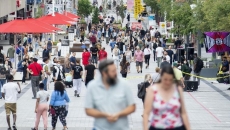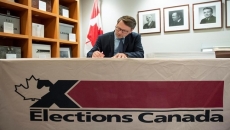Fully vaccinated U.S. citizens wasted little time Monday seizing their first chance in 17 months to venture into Canada, while lawmakers south of the border urged the White House to hurry up and follow Ottawa's lead.
As of 12:01 a.m. Monday, American citizens and permanent residents were allowed back on Canadian soil, provided they have had a full course of a COVID-19 vaccine approved by Health Canada.
To be eligible, travellers must live in the U.S., be 14 days past their last vaccine dose and show proof of a negative molecular test for COVID-19 that's no more than 72 hours old.
The Canada Border Services Agency also requires visitors to use the ArriveCAN app or online web portal to upload their vaccination details.
John Adams, a Florida resident who has been waging a relentless advertising campaign against the travel restrictions, said he was expecting to be back at his property in B.C. before the supper hour.
"Our long-awaited journey to get back to our home on Vancouver Island has finally begun," Adams wrote in an email from the airport in Tampa.
"So far, our experience has been totally hassle-free given the substantial new requirements."
The restrictions had barely been eased 10 minutes before Adams got text messages from two separate people who had already crossed — one at the Peace Bridge in Buffalo, N.Y., the other in B.C.
"I asked both to rate their border crossing on a scale of one to 10 and both rated it as a 10."
Fully vaccinated travellers who have recovered from the disease and are otherwise eligible to enter Canada can show proof of a positive molecular test taken between 14 and 90 days before crossing the border.
Denis Vinette, vice-president of the CBSA's travellers branch, said the agency learned a lot when fully vaccinated Canadian citizens were allowed to return under similar conditions last month.
About half had to be turned away during the first week because they hadn't received one of the four vaccines approved by Health Canada, or had not waited the full 14 days after their last shot.
Canada has approved four vaccines: Pfizer-BioNTech, Moderna, the Oxford-AstraZeneca shot, also known as Covishield, and the single-dose Johnson & Johnson option. All except AstraZeneca have been approved and widely deployed in the U.S.
For its part, however, the U.S. has resisted easing restrictions on non-essential travel at land crossings, and won't say when that might change. Air and sea travellers are exempt, though passengers by rail, ferry and pleasure boat are not.
Critics of that lack of action were quick to point out the discrepancy Monday.
"We should work in a co-operative way to find out how we can meet in the middle ground," Pennsylvania congressman Dwight Evans told an online panel hosted by the Canadian American Business Council.
"I believe that it can be done, and I think it is something that we just have to kind of get our heads together (on)."
New York Rep. Brian Higgins, one of the most persistent congressional voices on easing restrictions in the Canada-U.S. corridor, reiterated his demand for a U.S. plan to let travel resume.
Keeping the restrictions in place "harms separated families and hurts opportunities for economic recovery," Higgins tweeted. "The time to act is long overdue." '
U.S. border communities have been "decimated" by the restrictions, "with steep losses in employment, wages and sales tax revenues, among other economic impacts," says a new report from the Border Policy Research Institute at Western Washington University in Bellingham, Wash.
The White House did say last week that it is exploring whether to require discretionary visitors from outside the country to be fully vaccinated when the time comes to ease restrictions, although it remains unclear whether that discussion specifically includes Canadian travellers.
A labour dispute between the federal government and Canadian border agents was resolved promptly Friday, easing fears of extensive delays. But Vinette said the screening process is still going to take time, which means travellers may have to wait a little longer to clear customs.
"We're just asking folks to be patient."
The federal government is currently planning to allow vaccinated visitors from outside the U.S. to return to Canada for non-essential reasons as of Sept. 7.
This report by The Canadian Press was first published Aug. 9, 2021.
Note to readers: This is a corrected story. An earlier version said U.S.-bound rail passengers were exempt from travel restrictions.






